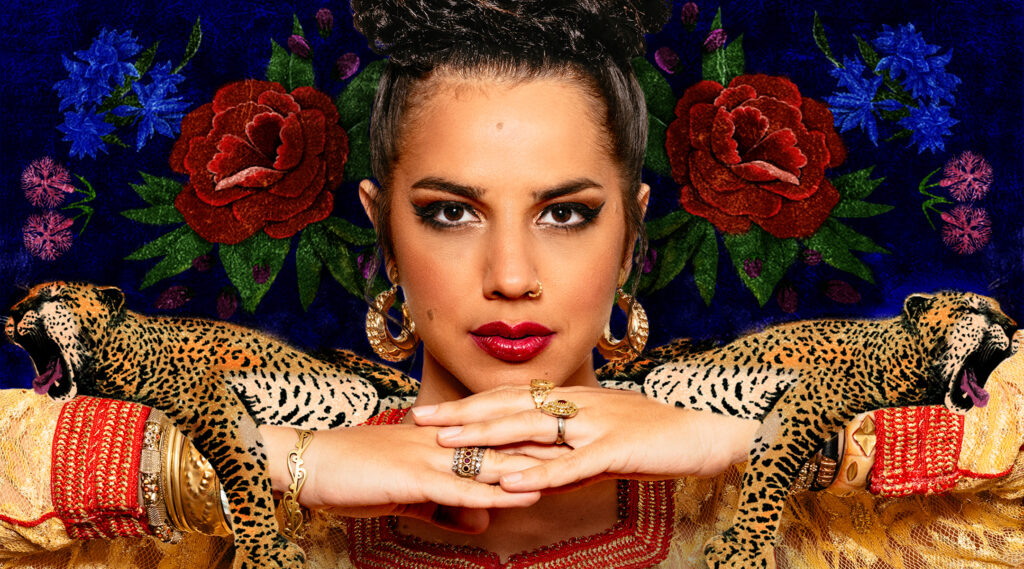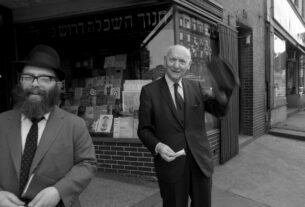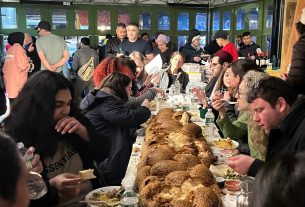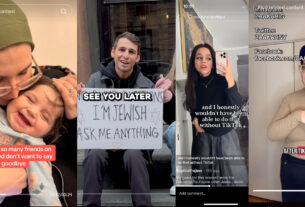(New York Jewish Week) — Though she grew up in Israel, Tamar Bloch’s childhood was a mishmash of cultures. With a Moroccan mother and Brazilian father, Bloch often heard Portuguese and Arabic alongside Hebrew, and felt connected with the music from all three cultures.
It wasn’t until she was in her early 20s, however, that Bloch discovered the language and culture of “Haketia,” a Romance language once spoken by Sephardic Jews in North Africa. Haketia has elements of Darija (Moroccan Arabic), Spanish and Ladino.
“I was hooked immediately,” Bloch, 33, told the New York Jewish Week. She could only find ethnographic recordings of Haketian songs at the Israel State Archives and at Hebrew University in Jerusalem, which she painstakingly transcribed and re-recorded herself — becoming the first modern artist to record an album in Haketia.
Over the last decade, Bloch — who goes by the stage name Lala Tamar; Lala is a Moroccan honorific meaning “Lady” or “Miss” — has traveled the world touring her music, working with bands and promoting the language and sound of Haketia.
This weekend, Bloch is traveling to New York from her home in Essouria, Morocco to perform several concerts at Lincoln Center for the Performing Arts. The New York Jewish Week caught up with her to talk about her performances in the United States and what Haketia means to her.
This interview has been edited for length and clarity.
New York Jewish Week: How did you become aware of Haketía and then decide to pursue it in your music?
Bloch: I did not know it as a kid. I grew up with a mom who did speak Darija, which is Moroccan Arabic, which integrated and mixed inside Haketia, and with a dad who was born in Brazil, so there was Portuguese and a lot of Latin music in the house.
So I grew up with the basics of Haketia at home — the words and the Latin languages and the Arabic languages surrounding me. But I never really spoke it because they were speaking it with the older generations, with my grandparents and not with us, the kids.
When I grew up a bit I fell in love with Moroccan music. I happened to hear Haketia music. Immediately, I was hooked. For me, it was a very condensed cultural combination of my background, of the way I grew up. Not only literally, with the words and the language, but also musically because it has this combination of Spanish and Andalusian music and North African music. It’s all fused together in Haketia. I decided that I needed to investigate and to search for more of this music. These songs were never really recorded in an artistically contemporary way. If anything, they were recorded for the sake of preservation as a part of ethnographic research for universities. But it was not out there as music for everybody. I felt that this music deserves to be heard and to be served to everybody. It doesn’t have to be a part of a long forgotten tradition that’s lost in the archives.
What has been like the most meaningful part of the last decade of bringing Haketia back into the modern world and of touring your music around the globe?
I think that the biggest moment was when I got into the playlist of Galgalatz in Israel, which is one of the country’s most popular radio stations. One of the singles got into a playlist, and it was the first time that Haketia was played on contemporary, popular radio. That was really exciting. Also when we released our album. Even though it was in the middle of COVID, so it did not get any of the attention we were expecting for it, it was still exciting to to release an album in this in this lost language, and to hear people play it at parties and to have people sending me videos in restaurants. It’s always exciting to hear it.
Support the New York Jewish Week
Our nonprofit newsroom depends on readers like you. Make a donation now to support independent Jewish journalism in New York.
I didn’t feel like I had a mission to make Haketia or this music more mainstream. It just happened because I felt that this music was relevant for me. I felt very much connected to it in a way that made me just release it as if there was nothing different about it, as if I would be singing anything else.
Why did you decide to move to Morocco from Israel during the pandemic?
I started performing in Morocco and realized that it’s always been the source of my inspiration, the fountain of my creation. At one of the festivals that I did there, I met Maalem (Master) Seddik, a Muslim musician that teaches Gnawa, a specific style of religious Moroccan music that I was fascinated by and, also, I was fascinated by the connection with the Jewish history in Morocco. I was waiting for the opportunity to go and study with him and then COVID struck and I had no job, of course.
Also, my inspiration and everything in my life that I create comes from Morocco. (During the 18th and 19th centuries, Jews made up nearly half of the population of Essouira — then called Mogador.) So when I was not singing I felt that my fountain was being dried out, so I already had this dream of going to study with him and I managed to find a way to get into Morocco which was really complicated at the time. He [Seddik] was waiting for me and welcomed me in. I started studying with him and he really adopted me, almost as a daughter, cooking for me, making me all these Jewish foods that he knows how to make from his neighbors and all his Jewish friends, and I just stayed. I have a lot of followers and an audience in Morocco as well as a lot of musicians that I work with so for me, it really felt like home from the beginning.
How does it feel to be performing in New York for the first time?
I have been doing online shows for Lincoln Center, but I’ve never performed physically in New York. It’s really exciting. I can’t describe how blissful we feel to come all this way. It’s a really big honor for my band’s first live performance in the United States to be at Lincoln Center.
I can only imagine how it will be because I don’t know. I can say I perform around the world, more than in Israel these past few years. I feel that this music has something that just can reach people from whatever background they come from. I hope that’s going to be the case as well, here in New York and New Yorkers are very open minded, very aware of what’s happening around the globe culturally.
Lala Tamar will perform a series of five concerts between May 5-7 at Lincoln Center for Performing Arts (113 West 60th St.). To find concert times and purchase tickets (choose-what-you-pay), visit their website.




